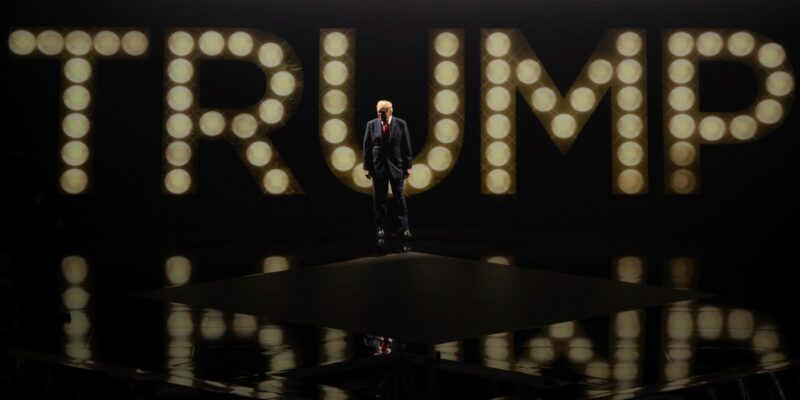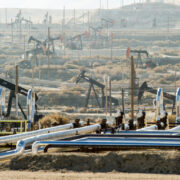
After all shouting and debating, all the billions in ads, and all the fury, the 2024 election will determine whether this nation remains committed to its imperfect democracy or slides toward fascism, whether the politics of hate, grievance, paranoia, fear, and racism triumphs or those of community and inclusion, whether women’s freedoms are curtailed or protected, whether climate change is ignored or addressed, whether the privilege of plutocrats is enhanced or challenged, whether millions of Americans are deported or granted a path forward. But the election will also determine whether Americans live in a world of facts or one of false narratives. It will tell us if America is reality-based.
Donald Trump, as a politician, is a creature of reality television. And reality TV is not real. It is designed to convey the impression of verisimilitude. But the story lines are concocted. The editing is manipulative. The goal is to orchestrate human interactions that can then be turned into compelling, don’t-touch-that-dial stories. They need not be true; they often aren’t. The trick is to fool the viewer into believing they are—or at least to persuade the audience go along with the ruse.
That’s what happened with Trump and The Apprentice, the NBC show he starred in for 14 years. Prior to its appearance, Trump was in a slump as a businessman, having gone bust in Atlantic City as a casino owner and moving from the development of large real estate projects to licensing his name as a brand. The show created a new reality for Trump, depicting him as a hyper-successful billionaire with razor-sharp intuition.
John Miller, a former marketing executive for NBC, recently noted that the network forged a “false narrative for Donald Trump as a big businessman.” Explaining this, he said, “Clearly we had to make something bigger than it was.” That something was Trump. He added, “If people think that he’s the person [to best handle the economy] because he was a great businessman, that is a false narrative. We did it for the show. But it became very dangerous now for the country.”
As Bill Pruitt, one of the producers of The Apprentice, pointed out earlier this year, deceit is at the heart of reality TV: “What actually happens is the illusion of reality by staging situations against an authentic backdrop… Although very few programs are out-and-out fake, there is deception at play in every single reality program. The producers and editors are ostensibly con artists, distracting you with grand notions while we steal from you your precious time.” Think of Trump pretending to work at a McDonald’s.
Trump entered the political world as this reality TV monster-celebrity. Millions of Americans saw him as the Trump of that show. The lesson for Trump, who had for decades devoted much energy and conniving to cultivating his image as a successful developer and glamorous playboy, was obvious: He could present a false personal tale and keenly exploit it.
Trump’s deep faith in hornswoggling was also enhanced by the close association he developed with professional wrestling. In the mid-2000s, he became a WWE fixture, and he and Vince McMahon, the WWE cofounder, cooked up a phony rivalry that they played out at high-profile wrestling matches. Trump enthusiastically adhered to what’s known in professional wrestling as kayfabe: the maintenance of a false reality in which staged events and rivalries are presented as genuine. Trump was inducted into the WWE Hall of Fame in 2013.
Ever since he descended the golden escalator in 2015—surrounded by extras who he had paid to show up and act like supporters—and announced his presidential candidacy, Trump has relied on deceit. He has inaccurately touted his own assets while lying about his opponents. As president, he declared that he knew how to deliver a better and cheaper healthcare system and sparkling infrastructure. That was a fraud. His claim that he was handling the Covid pandemic magnificently—another fraud. And he pitched a bogus story about his political foes in 2020: They were Marxists and communists in league with antifa, BLM, and other radicals in a plot to destroy America. Then came the Big Lie that he had won the election but it had been stolen from him.
“If people think that he’s the person [to best handle the economy] because he was a great businessman, that is a false narrative. We did it for the show. But it became very dangerous now for the country.”
Trump was always pushing disinformation, going back to years before he entered presidential politics, when he promoted the racist birther theory about Barack Obama and insisted his so-called investigators had unearthed evidence the 44th president had been born in Kenya. (Narrator: They had not.) But in this election, Trump turned the volume of his disinformation up to 11. His campaign to regain the White House—nearly four years after he incited the insurrectionist mob that attacked the US Capitol—has been largely based on utterly untrue narratives designed to exploit voters’ fears, anxieties, and prejudices.
In stump speeches, Trump has sought to portray the United States as a crime-infested hellscape on the verge of collapse where migrant gangs run amok and terrorize good-hearted and law-abiding Americans. And you, dear viewers, ought to be afraid, very afraid.
He and his partner-in-slime, JD Vance, have pushed baseless and dangerous allegations about legal Haitian immigrants in Springfield, Ohio, eating pets. Trump has asserted over and over that foreign thugs armed with military weapons have taken over Aurora, Colorado, and conquered other parts of the Midwest. He has claimed that America is being flooded with immigrants released from prisons and “insane asylums” in “the Congo” and elsewhere—and that the Biden-Harris administration has purposefully allowed these brutes to enter the country in order to ruin it. He charged that President Joe Biden “stole” disaster relief funds and handed the money to illegal migrants rather than use it to assist the victims of the recent Hurricane Helene. He has ranted that it is impossible to cross the street to buy milk without getting violently assaulted or raped. And Trump insists the Democrats are evil “scum” who allow the executions of infants after they’re born and who permit schools to conduct gender-affirming medical operations on students without the consent of parents.
None of this is true. These lies go far beyond his usual falsehoods: The economy during his presidency was the best ever, the current economy is the worst ever, the rest of the world is laughing at the United States, Kamala Harris is “low IQ,” a “communist,” “mentally disabled,” and so on. These falsehoods are designed to convey a fake reality—a catastrophe that only can be remedied by the election of Donald Trump. He is trying to create a reality TV horror show.
Simultaneously, Trump advances happy-ever-after magical thinking, often a selling point of reality TV. (Winners of The Apprentice got to work for Trump for a year—supposedly a ticket to success and the high life.) He proclaims that he can bring about prosperity by introducing extreme tariffs, deporting millions, decreasing taxes on the wealthy (and workers who collect tips, Social Security recipients, and overtime employees), and placing Elon Musk in charge of cutting the federal budget. (Musk absurdly says he can cut $2 trillion from the federal budget of $6.75 trillion.) Many economists point out that Trump’s plans will lead to inflation and a much larger national debt. He also boasts he will develop visionary infrastructure projects, such as whole new cities and airports of the future. (He couldn’t even pull off a single Infrastructure Week when he was president.) Trump’s grandiose ideas tend to be general, lacking specifics. The thrust of his pitch is what he said at the Republican convention in 2016: I alone can fix it. He’s not championing policy details. (To call his policy platform bare-boned is generous.) He’s presenting himself as the answer. It’s all reminiscent of the PR campaign for The Apprentice.
Trump’s characterization of present-day America is a false narrative. His sales pitch for himself is a false narrative. His demonization of Harris as a mentally deficient radical leftist and enemy of the United States is a false narrative. He has led the tens of millions of Americans who buy his bunk into a false universe.
This is how reality TV works. Fake good guys. Fake bad guys. Fake plots. As Pruitt described it, “We scammed. We swindled.” Trump is also a peddler of fake science and fake history. He insists climate change is a hoax. And, of late, he’s been falsely citing the 1890s as a time of plenty when “our nation was probably…the wealthiest it ever was because it was a system of tariffs.” Yet during this era, when robber barons ruled, there was a severe economic depression that’s widely attributed to the harsh protective tariffs implemented. His history lesson is another fairy tale unmoored to the actual facts.
As Election Day approaches, Trump has been endeavoring to construct a new false narrative—or the extension of an old one. He has started issuing claims of Democratic electoral cheating before votes are tallied. Without evidence, he and his crew began flinging unsubstantiated charges that an election was again being rigged against Trump. The ploy was obvious: to establish a foundation for Trump to once more declare himself the victor regardless of the vote count. His goal is to redefine reality to his benefit and for a second straight election beset the nation with turmoil and chaos as part of a brazen and anti-democratic power grab.
In 2004, journalist Ron Suskind, writing about the George W. Bush White House, recalled a conversation he had two years earlier with a senior adviser to the president. This unnamed aide dismissed what he called “the reality-based community,” which he defined as people who “believe that solutions emerge from your judicious study of discernible reality.” He told Suskind, “That’s not the way the world really works anymore. We’re an empire now, and when we act, we create our own reality.” This squib prompted a ruckus within the politerati, with much harrumphing about a hubristic gang that believed it was above facts and did not have to abide by truth and facts. Two decades later, such outrage seems quaint.
Trump has been engineering his own counterfeit reality for years. The media and the political system have each collectively failed to thwart him and prevent him from convincing millions across the country of the uber-fakery about himself and the world in which we live. He has turned the entire nation into a reality TV show with (so far) three acts: His initial surprise victory in 2016, his expulsion from the White House (due to the worst-ever chicanery waged by assorted miscreants and nefarious forces) in 2020, and his gallant effort at restoration and redemption in 2024. The results of this election will establish whether the biggest con in American history continues and whether an electoral majority resides in Trump’s fantasy cosmos or a universe of facts and authenticity. Much is at risk, including the future of America democracy and reality itself.















